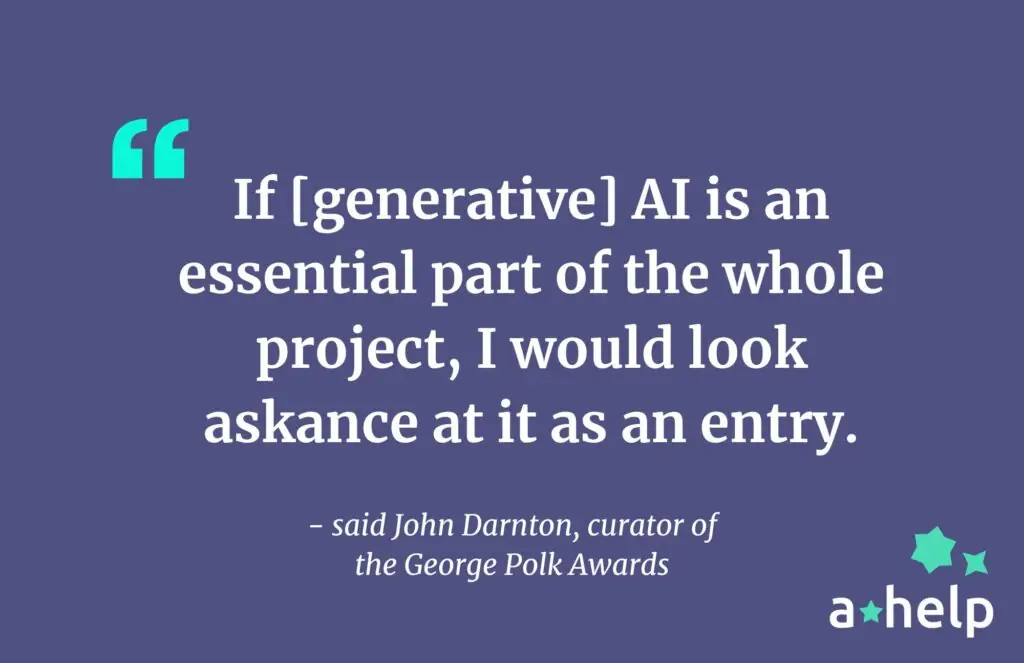According to a recent article, the prestigious Pulitzer and Polk awards are adapting to the evolving landscape of journalism by considering entries that utilize generative AI. As the industry integrates AI into reporting and storytelling, these awards aim to recognize the innovative use of technology while maintaining the integrity of investigative journalism.

✅ AI Essay Writer ✅ AI Detector ✅ Plagchecker ✅ Paraphraser
✅ Summarizer ✅ Citation Generator
Key takeaways:
- For the first time, the Pulitzer Prizes have required entrants to disclose the use of AI in their submissions, with five out of 45 finalists reporting AI usage in their journalism processes.
- The Pulitzer board has adopted an exploratory stance towards AI. They aim to understand its capabilities and risks without restricting its use in newsrooms, as highlighted by board member Mark Hansen.
- The George Polk Awards are also planning to develop an AI disclosure policy. It will focus on the fact generative AI aligns with the spirit of recognizing individual reporters’ efforts.
Why Is There AI Talks Regarding a Journalism Award?
The inclusion of AI in journalism awards marks a significant shift in recognizing the role of technology in reporting. The Pulitzer board’s decision to require AI disclosure reflects a desire to stay informed about the evolving tools used in journalism. Marjorie Miller, the Pulitzer Prize administrator, emphasized the importance of understanding AI’s potential and challenges in the industry.
While the Pulitzer board is open to AI usage, they are cautious about its implications for copyright law, data privacy, and bias in machine learning models. The board’s approach, as described by Hansen, focuses on sampling the creativity journalists bring to generative AI while being mindful of its limitations.
The Polk Awards’ Stance
The Polk Awards are also trying to handle integration of AI, with curator John Darnton expressing reservations about relying on AI for moral judgments in investigative projects. However, the awards are considering requiring entrants to disclose AI usage, allowing judges to assess each entry on a case-by-case basis. The incorporation of AI into journalism awards highlights the need for the industry to adapt to technological advancements while preserving the human element of reporting. As the AI usage increases rapidly, award organizations will need to balance recognizing innovation with upholding the integrity of journalistic work.

Is There Really Any Difference AI and Human Content?
As technology evolves, the line between AI-generated and human-written content is being blurred out further and further. AI-generative tools can produce content quickly and are often used to handle large volumes of writing tasks. However, AI-written content might lack the emotional depth, creativity, and personal touch that human writers bring to their work. Human writers, on the other hand, can infuse their writing with personal experiences, emotions, and a unique style that resonates more deeply with readers. We’re able to understand complex contexts and nuances, so the content seems more engaging and relatable.
How to distinguish the two types of content? Human-written text often contains nuanced opinions, detailed personal anecdotes, and a clear, unique voice. AI-generated text, while improving, sometimes lacks these elements and may feel more generic or repetitive. Writers and content creators are increasingly using AI to assist in their work, leveraging these tools for research, idea generation, and even drafting content. However, they often refine AI-generated drafts to add a personal touch, ensuring the final piece reflects human insight and creativity.
Follow us on Reddit for more insights and updates.





Comments (0)
Welcome to A*Help comments!
We’re all about debate and discussion at A*Help.
We value the diverse opinions of users, so you may find points of view that you don’t agree with. And that’s cool. However, there are certain things we’re not OK with: attempts to manipulate our data in any way, for example, or the posting of discriminative, offensive, hateful, or disparaging material.